Not the "Symposium" but rather Plato's "Republic" begins with his character of Socrates remembering a descent to the Piraeus.[1] It was the lowly Piraeus, in its function as the port of Athens, from which novel and foreign things tended to be made available to his (Socrates') high city. And philosophy, as an expression of the longing for knowledge in the true sense, depended upon Socrates' willingness to move and look precisely there: beyond the familiar.

Ebony G. Patterson in the Winter Experiment
Between January 15 and February 5, 2011, the "Winter Experiment" was played out within gallery moniquemeloche.[2] In order of appearance, Ebony G. Patterson, Dan Gunn, Ben Fain, and Anna Shteynshleyger built installations within the space: each person in succession staging the scene for his or her own Saturday afternoon interview, followed immediately by a week-long exhibition of artwork.
It might seem a great leap from "The Republic" to the "Winter Experiment," so that it would be natural to wonder about the connection between the second and third paragraphs of this article. Such a relationship as might exist is dependent upon one's willingness to accept that the gallery (any good gallery) has the potential to function within Chicago in a manner which is comparable to the Piraeus in its relation to Athens, i.e., a place in which the novel and foreign are likely to appear.
Those who went down, here, found within each week's installment: artwork; a pairing of artist and interlocutor; other spectators; and members of the gallery staff. Taken together, the aforementioned elements of the "Winter Experiment" were said to constitute not a "traditional" commercial show but rather a community engagement. And curiously (given the context) the element of visual art might well have been only ancillary to the human interaction ongoing in its vicinity. Encouraging consideration of that possibility (the subordination of the visual to the auditory) is evidence found in the one other "Winter Experiment" article yet published. The young Erik Wenzel, Senior ArtSlant Staff Writer, recalled in text a singular visit which he made during the event's second weekly convocation.[3] Therein, Wenzel chose to employ twenty (cumulative) repetitions of the words: converse or conversation, dialogue, talk, discussion and discourse.[4]
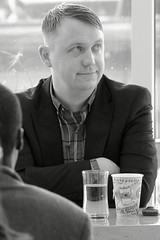
Dan Gunn in the Winter Experiment
In contrast, no word related to the visual properties of an artwork--such as color, line, shape, texture, scale, proportion--ever appeared in the (Wenzel) piece on ArtSlant; not even the broad categories of painting, drawing, video, and photography, each present in the "Winter Experiment," were invoked.[5] The artwork "said" nothing so important to Erik Wenzel (or any other local writer) that he felt the need to repeat it. Is that in itself noteworthy? If so, is it telling of the writer(s), the engagement, or the material on display?
The artwork hung silently in the gallery during Wenzel's visit; an image of the artwork appeared without comment in Wenzel's article; the artwork seen by Wenzel was made by someone said to have experience building theater props. Maybe it (visual art) is now expected to serve as support for speeches, and nothing else. Having written that, it would be imprudent to rush towards a particular conclusion.
In fact, the boundaries of the "Winter Experiment" were not fixed but rather they expanded and contracted according to the number and activity of all participants--continuing, perhaps, to the reading of this text. The position, the movement, of the general public seems therefore important--in "relation" to the whole of the experience. To what, and to whom, did Chicago respond in this case? Why?
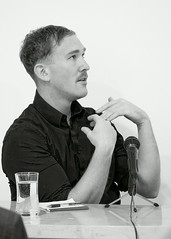
Ben Fain in the Winter Experiment
Were the attendance of the "Winter Experiment" to be graphed it would take a bell-shaped form: climbing from the first week to peak in the second and third weeks, falling again in the fourth and final week. What might have affected the attendance? The time and location of the event remained the same from week-to-week, and so ought not to have been a factor. The event could only have become better known over time, so that the last week should have enjoyed the largest audience; it did not. The weather did vary from January 15 to February 5; but, being Winter in Chicago, it (the weather) was never especially good.
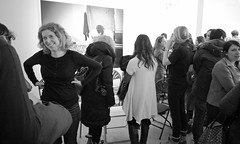
Anna Shteynshleyger in the Winter Experiment
Critically, in retrospect it seems that the strongest correlation proved to be between that which was familiar to the people and that which the people came to see. Those parties (pairings of artist and interlocutor) who in sum had the greatest presence in what is called the Chicago art community--Dan Gunn and Michelle Grabner in the second week and Ben Fain and Shannon Stratton in the third week--drew the largest numbers.[6] The chance of sighting the novel and foreign did not in the end seem equal to the motivation provided by association, habit, and self-interest. Remembering the second paragraph above, such patterns, seen repeated elsewhere and over time, are worrisome.
"Discussion," "dialogue," and even "dialectic," all presuppose the competent articulation of multiple, relevant ideas. And, ever more frequently, one is made to wonder whether the new psychological monolith of "community" has hampered both the outward movement of its members and also the inward movement of the bearers of the counterargument. It's a bit of a game of semantics: while the words (above listed, such as "discussion") continue to circulate, that which they are thought to represent in speech has changed over time in the world of action. Even so, teasing out the tandem smothering deaths of philosophy and art, by means of the analysis of one critical blurb and one pattern of attendance, might be something more than melodramatic. It seems very much more realistic to begin by wondering in what form "high culture" was ever alive within the visual arts here, as some have implied that it has suffered only maltreatment from its inception.
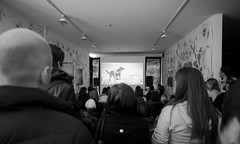
Ben Fain video in the Winter Experiment
While explaining the struggle and eventual failure of the publication "New Art Examiner" in relation to Chicago's perpetual "Second City" status, Derek Guthrie suggested in his 2008 Bad at Sports interview that: "We [Guthrie et al] were on the wrong side of the anti-intellectual machine that runs this city, and Chicago will never be an art center as until such times, and I don't care if three Picassos are born next week, it will never happen until we start having discourse and discourse just means that you have discussion..."[7]
Following Guthrie, in the listener comments which were able to be appended to that interview at the time of its airing, Mark Staff Brandl concurred: "[...] I think he is mostly dead-on about Chicago. Certainly, that 'anti-intellectualism' he fought has now been replaced with a strange pseudo-intellectualism, yet it all remains structurally the same with new masters, mistresses: bigoted machinations of those who have petty close-mindedness. An approach stifling [sp.] dialogue and having all the negative effects exactly as Derek outlined them, with the added bonus of hypocrisy."[8]
Not a smothering death per se, but both Guthrie and also Brandl wished to suggest that a (using Brandl's word) "stifling" of much local growth is to be expected, given Chicago's intellectual climate. Returning to the original subject, the "Winter Experiment" did in every case formally pair its young artists with relatively sympathetic questioners in order to more readily elicit thoughtful responses from them. But, when viewed across the four-week period for which it ran, the "Winter Experiment" did also include a broad range of artists and questioners; it was, after all, meant to introduce new things. If the generalized (poor) response of the "Chicago art community" to the things outside of itself (the novel and foreign, not to mention the rebuttal or counterargument, etc.) is at issue, are the references (above) to an "anti-intellectual machine," and "masters, mistresses," an indication that the quotations from Guthrie and Brandl are irrelevant? Or, are there both top-down and also a bottom-up relationships--maybe not unlike the political symbiosis between an apathetic public and manipulative officeholders--which are equally needful of consideration?
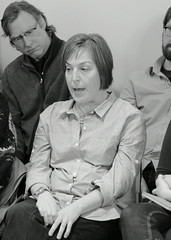
Claudine Ise in Crisis-Free Arts Criticism
One year after Guthrie's interview the ability to directly append comments (such as Brandl's) to articles was removed from the Bad at Sports website.[9] Public participation (at Bad at Sports) is now channeled via e-mail (or phone call?) through the blog's editors, whom might or might not post all of the submitted text in some place of their choosing. It appears to be the case that, to date, one comment has passed through said system to become seen.[10] And only (Bad at Sports) members, or guests invited by members, now find participation possible. Monologue was facilitated; dialogue was inhibited; metaphorically, the wagons were circled.
Per Bad at Sports' audio hosts Richard Holland and Duncan MacKenzie, California natives Meg Onli (moved to Chicago in 2005) and Claudine Isé (moved to Chicago in 2008) now manage the group's on-line writing. And with regard to "discussion," Onli and Isé named the finest of the past year (2010) as, "Studio Chicago, a yearlong collaborative project focusing on the artist’s studio."[11] Self-identified as "Core Partners," the "Studio Chicago" members--Chicago Department of Cultural Affairs, Columbia College Chicago, DePaul University Museum, Gallery 400 at UIC, Hyde Park Art Center, Museum of Contemporary Art, School of the Art Institute of Chicago, and threewalls--in turn named the "Studio Chicago Blog" as their "forum for discussion."[12]
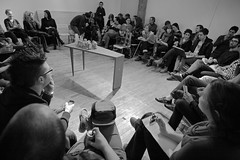
Crisis-Free Arts Criticism Salon in threewalls
In a familiar pattern, over the one-year life of "Studio Chicago," its, (a) Core Partners invited guests to post the "Studio Chicago Blog" for a period of one week; (b) guest posts were subject to moderation by Core Partners; and (c) comments deemed inappropriate and/or off-topic were removed at the Core Partner's discretion.[13] In short: control was (again) exercised or reserved to be exercised over every aspect of the "Studio Chicago" discussion component. Did that control serve a necessary purpose (removal of threat, libel, etc.) only; or, upon close examination, might parties, e.g., Guthrie and Brandl, reasonably suggest that the exclusion of some viewpoints inhibited the "life" of what's properly called discussion? How might it be possible to begin to consider whether any given control is editorial or censorial?
Between October of 2009 and October of 2010, 59 "Studio Chicago Blog" entries were produced through the combined efforts of eight major (and minor) organizational players in Chicago's visual culture; they included 1 introductory post and 58 pieces of content.[14] According to some criteria, gender for example, a great effort to "balance" the writers appears to have been made. Noting that some of the 58 pieces of content had multiple authors, and that some of those authors contributed on more than one occasion: 28 posts had female authors and 26 posts had male authors.[15] While not proportional to Chicago's demographics, with regard to race and ethnicity too an attempt at inclusion seems evident. But in other areas the evidence tells a different story.
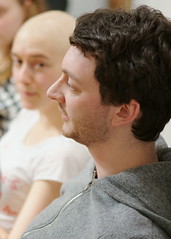
Lori Waxman (background, at left) in Crisis-Free Arts Criticism
"Studio Chicago" was, manifestly, a demonstration of privilege attendant to "community," i.e., acceptance into one or more of Chicago's many organizations. Only very few--if any--of the chosen posters might not have had an affiliation with an academic institution, co-operative, not-for-profit, government entity, or other such group.[16] "Studio Chicago," in spite of what its name might have been thought to imply, was not an opportunity for individual visual artists to share the details of what transpired in their studio in Chicago. Whether one was an artist, occupied a physical studio, created tangible objects, or had any longstanding connection to the city was largely irrelevant. "Studio Chicago" leveled the distinctions between artists and curators, art making and social action, the visual and theatrical arts, one place on the globe and any other place on the globe. From the onset it was taken as given that "art" and a "studio" might equally well be any one of a number of things--meaning that many of the chief questions were answered by the Core Partners before being known to the public.[17] The cumulative effect was to lionize the collective, the egalitarian, the non-traditional, and the anti-commodity. Where was the oversight? Where were Chicago's critics?
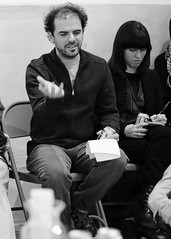
Pedro Velez in Crisis-Free Arts Criticism
Independent of "Studio Chicago," on March 1, 2011, former "Core Partner" threewalls hosted "Crisis-Free Arts Criticism,"[18] which was called a public discussion. Arts writers Jason Foumberg, Claudine Isé, Lori Waxman, and Pedro Veléz, were invited to lead a conversation which addressed the widespread perception of "an apparently ceaseless 'crisis of criticism,'" in Chicago.[19] Jason Foumberg declined.[20] And threewalls' representative Ania Szremski was left to guide the remaining three figures.[21]
Given that in staging the event Szremski/threewalls had acknowledged the existence of a broadly held, long-term concern with arts writing in Chicago, only to then dismiss that concern as "insecurity," it seemed noteworthy that all of the invited leads were invested in the status quo,[22] and had previously demonstrated support for one another or the position of Szremski/threewalls.[23] It was so very noteworthy that after the introduction of "Crisis-Free Arts Criticism" had been completed, and the floor opened for the first question, Szremski was asked directly why no representative of the counterargument had been invited.[24] First acknowledging the pre-existing consensus, Szremski went on to explain that the counterargument was excluded because, "We wanted this to be a productive discussion."[25] Considering the potential meaning of that response it would be good to wonder: Productive of what?
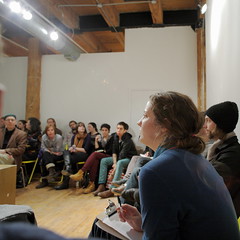
Ania Szremski in Crisis-Free Arts Criticism
For those who have hoped to participate in an unfettered exchange of ideas--whether in speech, or in text, or in visual form--the situation in Chicago does at times seem less than ideal. Where the novel and foreign have been made available, the "Chicago art community" has seemed not moved to look. And where the representatives of the counterargument have been willing to move and participate, the "Chicago art community" has seemed to "wall them out." If not all things are good to see, and not all speech is helpful, how should the good and the helpful be known apart from a thoughtful consideration of the whole, in which the evidence and arguments--for one thing and against another thing--are seen and heard. We depend upon our questions, as much as any answer, to better know the truth. Models of "practice" which rely upon unquestioning belief and partisan action have the effect of pushing art towards the realms of religion and politics. And that's dangerous ground, especially when public money is used to support the activity.
[1] http://classics.mit.edu/Plato/republic.2.i.html
[2] http://moniquemeloche.com/winter-experiment-2011/
[3] http://www.artslant.com/chi/articles/show/21264
Above: "Winter Experiment," by Erik Wenzel, ArtSlant, January 24, 2011
[4] Ibid.
[5] Ibid.
[6] Witnessed by author; confirmed by gallery staff.
Full "Winter Experiment" 2011 schedule:
January 15: Ebony G. Patterson & Tumelo Mosaka
January 22: Dan Gunn & Michelle Grabner
January 29: Ben Fain & Shannon Stratton
February 5: Anna Shteynshleyger & Andreas Waldburg-Wolfegg
[7] http://badatsports.com/2008/episode-168-derek-guthrie/
Above: Hear Derek Guthrie in original "podcast" audio from 40:00-40:29, November 16, 2008, Episode 168: Derek Guthrie
[8] Ibid.
Above: Comment (in text) appended by Mark Staff Brandl, November 19th, 2008
[9] http://badatsports.com/2010/letter-to-the-editor-britton-bertran/
Above: In response to "Letter to the Editor," by Britton Bertran, May 2, 2010, Meg Onli wrote that, "[...] we [Bad at Sports] removed comments with the new site launch on November 1st, 2009"
[10] Ibid.
[11] http://blog.art21.org/2010/12/31/center-field-art-in-the-middle-with-bad-at-sports-top-10-chicago-art-events-in-2010/
Above: Meg Onli and Claudine Isé, December 31, 2010: "Best city-wide, sustained, multi-platform discussion of a single topic in contemporary art: Studio Chicago..."
[12] http://www.studiochicago.org/
[13] http://studiochicago.blogspot.com/
[14] Ibid.
[15] Full "Studio Chicago Blog" posting schedule:
October 26, 2009: Barbara Koenen
November 4, 2009: Philip von Zweck
November 16, 2009: Michelle Grabner
November 23, 2009: Jacqueline Terrassa
December 1, 2009: Joyce Owens
December 7, 2009: Kevin Henry
December 14, 2009: Jim Duignan
December 21, 2009: David Moré
December 29, 2009: Abigail Satinsky
January 4, 2010: Dominic Molon
January 11, 2010: Mathew Paul Jinks
January 18, 2010: Karsten Lund
January 25, 2010: Lisa Stone
February 1, 2010: Katie Hawkey Swindler
February 8, 2010: Sarah Laing
February 15, 2010: Rey Colón
February 22, 2010: Abdul Goler
March 1, 2010: Brian Tyler Wright
March 8, 2010: Jon Cates
March 15, 2010: Diana Nawi
March 22, 2010: Stan Chisholm
March 29, 2010: Arti Sandhu
April 5, 2010: Beth Wiedner and Faiz Razi
April 12, 2010: Jessica Hutchinson
April 19, 2010: Irena Knezevic
April 20, 2010: Irena Knezevic
April 22, 2010: Irena Knezevic
May 3, 2010: John Neff
May 5, 2010: John Neff
May 11, 2010: Sze Lin Pang
May 17, 2010: Thea Liberty Nichols
May 24, 2010: Adam Brooks and Mathew Wilson
May 31, 2010: Sara Schnadt
June 7, 2010: Angee Lennard
June 10, 2010: Angee Lennard
June 15, 2010: Jessica Cochran
June 23, 2010: Jessica Cochran
June 23, 2010: Maggie Leininger
June 30, 2010: Jennifer Geigel Mikulay
July 6, 2010: Judd Morrissey and Mark Jeffery
July 21, 2010: D. Denenge Akpem
July 28, 2010: W. Keith Brown
August 2, 2010: W. Keith Brown
August 2, 2010: W. Keith Brown
August 4, 2010: Melissa Stanley
August 12, 2010: Adia Millett
August 19, 2010: Cauleen Smith
August 25, 2010: Annie Heckman
September 1, 2010: Adam Grossi
September 8, 2010: Shane Aslan Selzer
September 13, 2010: Elissa Papendick and Libby O’Bryan
September 15, 2010: Louise LeBourgeoise
September 22, 2010: Nicolette Michele Caldwell
September 29, 2010: Zach Dodson
October 6, 2010: Alberto Aguilar
October 13, 2010: Peter Fagundo
October 20, 2010: Chad Kouri
October 27, 2010: Conrad Freiburg
[16] See:
InCUBATE
Stockyard Institute
Industry of the Ordinary
Green Lantern
The Post Family
ARTivention
Open Studio Project Inc.
Bad at Sports
Spudnik Press Cooperative
Chicago State University
School of The Art Institute of Chicago
Harold Washington College
Columbia College Chicago
Hyde Park Art Center
Museum of Contemporary Art
threewalls
Alverno College (Milwaukee)
DePaul University Museum
City of Chicago
Gallery 400 at UIC
[17] http://studiochicago.blogspot.com/2009/11/introductory-thoughts-on-studio.html
Above: Paul Klein and Wesley Kimler attempted to voice their objections after the November 4, 2009, post. Neither Klein, nor Kimler, nor any representative of their position, i.e., the counterargument, ever wrote an invited post in the "Studio Chicago Blog."
See also: http://www.chicagoreader.com/chicago/kimlers-complaint/Content?oid=896646
Above: "Kimler's Complaint" in "The Reader" for a lengthier treatment of the issue.
[18] http://badatsports.com/2011/threewallssalon-crisis-free-art-criticism-discussion-tonight/
[19] Ibid.
[20] Author witnessed same reported at the event.
[21] Ibid.
[22] See:
Claudine Isé: artforum.com, Bad at Sports, Art21 Blog
Lori Waxman: Artforum, Bad at Sports, Chicago Tribune
Pedro Veléz: artnet.com
[23] http://badatsports.com/2009/forget-the-olympics-what-the-second-city-really-needs-is-first-class-art-news/
Above: Claudine Isé, October 5, 2009: "My advice to the Trib: get freelancer Lori Waxman on staff and make her a reporter or something–I don’t fucking care..."
http://badatsports.com/2009/episode-177-art-journalism/
Above: Pedro Veléz, January 19, 2009: "There’s more than enough art criticism in Chicago. and has been that way for a long time..."
http://studiochicago.blogspot.com/2009/11/introductory-thoughts-on-studio.html
Above: Pedro Veléz in response to Paul Klein's questions, November 9, 2009: "...This obsessive Jihad against everything you guys don't agree with is pathetic."
http://www.artnet.com/magazineus/reviews/velez/2010-chicago-review1-13-11.asp
Above: Pedro Veléz on Ania Szremski in "Chicago 2010" on artnet.com: "Academic art writing--criticism, theory and opinion--is well served in the city. Whitney Stoepel and Ania Szremski collaborate with F News Magazine..."
http://www.artnet.com/magazineus/reviews/velez/2010-chicago-review1-13-11_detail.asp?picnum=19
See also image above.
http://60wrdmin.org/resume
http://www.shannonstratton.com/curriculum-vitae/
Above: Lori Waxman, "Shannon Stratton," artforum.com "Critic’s Picks" April 30, 2008.
(Shannon Stratton is Director of threewalls.)
http://www.three-walls.org/store/publications/
Above: Lori Waxman's writing for sale on-line at threewalls' store in the texts, "Talking With Your Mouth Full: New Language For Socially Engaged Art" and, "Artists Run Chicago Digest"
[24] Author put the question to Ania Szremski.
[25] Author witnessed same reported at the event.
Questions:
- Might the fullest possible development of any one role within the arts, i.e., "expertise," have come to be inhibited by the division of time and effort between the multiple roles presupposed by the vogue "constellation of practices" model?
- Might the coincidental mushrooming of the "art blog" and the "apartment gallery" have practically eliminated all qualitative entry barriers both to exhibition and also to the interpretation and/or promotion thereof?
- Might the relatively new on-line social networks, e.g., Twitter and Facebook, have tended to reinforce "communitarian" thought and behavior?
- Within the arts specifically, might the increasingly young age, and corresponding inexperience, of most "role players" hamper sound judgment?
- Might the fear of social sanction have grown in relation to the broadly perceived need to "network" rather than work in isolation, further inhibiting frank exchange and honest evaluation among critics and curators?
- Might the "new" political rhetoric as exercised within (recently ascendant) Chicago have tended to incorporate youthful, majoritarian, and social justice themes?
- Might the economic deterioration of Illinois have heightened at least the perception that there is little compensation available in exchange for most arts activity, increasing the incentive to play yet more "roles" in employment outside of the arts?
- Might the possibility of careful, studio-based, object production have diminished as a result of the real growth of both "social practice" and also what is known as a "constellation of practices" model?
- Might the chronic exclusion of the counterargument and the minority position from "discussions," given all of the above, have come to be generally accepted as a social good?[26]
[26] Author attempted to introduce the questions above at "Crisis-Free Arts Criticism," and was then named in public a "debaser," by attendee Easton Miller.
- Paul Germanos
No comments:
Post a Comment